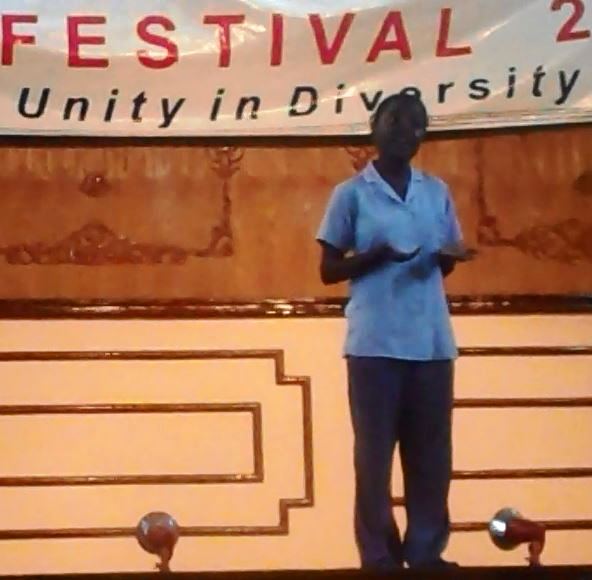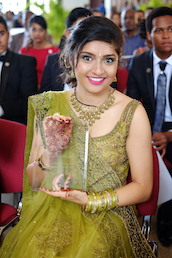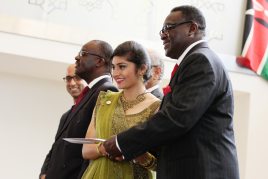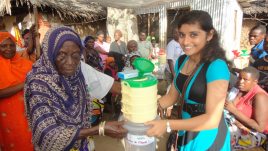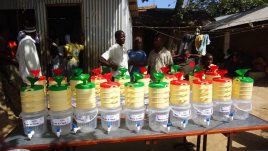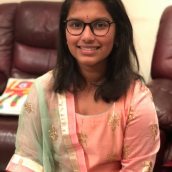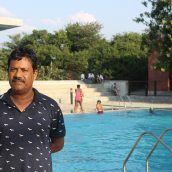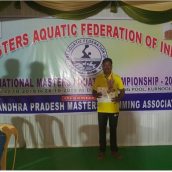Karishma Bhagani (Class of 2015): Making a splash for clean water
Look below for a video of Karishma speaking at the Passion in Science Awards.
Last year, 20-year-old Karishma Bhagani of Mombasa, Kenya was awarded a seed grant at the NYU Reynolds Changemaker Challenge, beating out eight other teams and 46 other projects. Bhagani won the seed grant for an innovative water purification system that makes the most of natural resources in cash-strapped communities that need clean water. Her initiative, Matone De Chiwit, came about as a solution to a problem she noticed: more and more diseases were emerging as a result of fluctuating weather in the country, ranging from floods to drought conditions. She knew that something had to be done.
Matone De Chiwit means “drops of life” in three different languages. Matone means drops in Kiswahili (Kenya), de means “of” in Spanish (Latin America) and chiwit means “Life” in Thai (Thailand). These three languages represent the three parts of the world that suffer the most from clean water scarcity. It also speaks to the global nature of her venture, as Bhagani intends to expand her project to these three regions and beyond.
Aga Khan Academy as an Inspiration
Bhagani is a fourth-generation Kenyan who recently moved to New York City where she is studying drama, history and South Asian studies at New York University. The Aga Khan Development Network has always been a part of her life as she was one of 17 students at the Aga Khan Academy in Mombasa who made up the first class to have been educated from pre-school to IB graduate.
The biggest lesson that Bhagani drew from her education is to be a holistic student. She strives to be as well rounded as possible, striking a balance between a social life, sleep, work and school, all with the goal of making a global impact. This pursuit of balance was inspired by her many years at the Aga Khan Academy.
“I think that at the end of the day what everything comes down to is how we can be citizens of the world and how we can change the world that we live in to make it a better place for ourselves and children that follow us. And part of that also means giving back to your own community,” said Bhagani.
When she was in middle school, she was required to carry out a personal project on something that inspired her. Having noticed the drastic fluctuations of weather and rampant diseases in her country, Bhagani decided that she would come up with an innovative water purification system that uses readily accessible natural resources. Her initiative uses locally available materials – sand, gravel, charcoal and cotton cloth – to purify water for villagers all across Kenya. The initial version of the product also used chlorine tablets called Aquapur. Bhagani received generous sponsorship funding from Davis & Shirtliff, a local water supply company, for donating 20 units to a community to test for effectiveness. “A lot of the families said that the water was ‘tamu sana’ which in English means very sweet,” said Bhagani.
Before Bhagani came up with her product, local families were typically just drinking untreated water, using a lot of energy to boil it on charcoal-heated stoves or using Aquapur chlorine tablets.
Testing and Improving
Through testing and implementation in villages, Bhagani and her partners came to the realization that using chlorine in a plastic container might not be the best idea. These tablets can actually be dangerous to human health — high doses can be potentially harmful as the plastic in the bottles reacts with the chlorine, resulting in the spread of more serious illnesses. So they decided to change it to moringa oleifera, essentially dried seed kernels of drumstick tree powder. Then, she carried out a lot of testing by collaborating with the Coast Water Services Board. She found that the new version worked just as well as the chlorine unit did.
When she was in the IB program at the Academy, she had the opportunity to take her unit to the Golden Climate International Environment Project Olympiad. That’s where she carried out even more research and testing to modify and improve the system. Her project ended up advancing to the national round, then the international round, where she won gold in its category.
It was at this point that she decided to patent the product. She applied before starting at NYU and received the patent while she was a first-year student.
Why Matone De Chiwit?
What sets Matone De Chiwit apart from competitors is that the device is both chlorine-free and cost-effective. Since it’s made up of natural resources common in rural Kenya and other parts of Africa, they can be replaced easily, which means users don’t have to rely on Matone De Chiwit to replenish the filter. Charcoal is easily found and other ingredients, like the drumstick tree powder, can be grown in their backyards. Additionally, Moringa olifeira grows in a variety of climates and doesn’t need much water to grow.
In terms of cost, it’s much cheaper in the long-term than what is currently used. Even so, Bhagani intends to ensure it’s affordable for rural villages by applying for sponsorship and grant funding from large companies all over Europe and North America. Her venture is also bridging the gap from the city to the village, because she is working with people from each of those communities and bringing them together to achieve clean water and sanitation for all.
The Future
With the seed grants that Bhagani recently received, including the Reynolds grant, she plans to carry out her first beta testing. The biggest challenge for her at the moment is having an adequate source of funding to collect data.
“It’s kind of a chicken-and-egg situation because we need more evidence of this product working in practicality in communities so that we can apply for more grants to sustain us, but without the grants it’s difficult to go out into the communities to actually grow these projects with that seed money,” said Bhagani.
With the little funding that she currently has received, she plans to establish the purifiers in at least two or three communities. Bhagani will continue checking on the units to get enough data so she can apply for larger grants and potentially work with philanthropies like the Gates Foundation. She also hopes to conduct more research on its effectiveness through beta testing in communities.
“In five years’ time, I hope to have conducted at least ten beta tests in Mombasa, and have expanded the venture all across Kenya. My intention is to begin applying for larger grants by that time so that we can expand to other countries around the world,” said Bhagani.
Additionally, she plans to collaborate with other Aga Khan academies in Hyderabad, India and Maputo, Mozambique. That collaboration could build on student organizations that can work with the rural communities that they already engage with.
Her long-term plan is to create a sustainable community, which not only bridges the urban/rural divide but also allows families to provide for themselves.
This spotlight is republished courtesy of AKF USA.
Tvisha Devavarapu - Class of 2018 top scorer
Tvisha never shied away from sports and captained the Nizam house in her final year of school. She also loves reading and led the Academy's Modern Literature in Translations Club. At the same time, Tvisha was also excellent academically. “Football enabled me to balance my studies,” she says. “It was an exhilarating stress buster. I’ve never had more fun in school than whilst I was playing football.” She also attributes a lot of friendships she made to the game.
Tvisha joined the Academy in grade 9 because she felt that the school’s values aligned with hers. “The Academy’s mission statement offered a more promising and holistic learning experience compared to the other schools,” she said. Once at the Academy, Tvisha lapped up all she could of the IB curriculum. She enjoyed the objectivity in Biology and Maths classes, and also appreciated the nuances of History and English. She was an active participant in Theory of Knowledge discussions and service activities.
Tvisha volunteered at Teach for Change, an NGO that gave her the opportunity to teach at a public school. “I didn’t only aid the children with their communication and leadership skills but also worked on my own character and values,” she says of the experience. “I strengthened my commitment, resilience, and communication skills, learning to accept and react to challenges in a proactive manner.” Grade 11 students are actively encouraged to take part in summer service internships at locations across India, working with AKDN (Aga Khan Development Network) institutions and other non-profits. “The Academy has a very unique, highly diverse and multicultural environment,” says Tvisha. “This really played a role in enabling me to broaden my perspective through a cosmopolitan way of perceiving things.”
Tvisha is headed to pursue her undergraduate studies at the University of California, San Diego in September 2018. In the near future, Tvisha wants to focus on science and research. But in the long run, Tvisha wants to try her hand at teaching if she gets the chance. “This must surely be the impact of my experience at the Academy,” she says. “Spending time with people like Ms. Alex, I’ve seen the dynamics of the intersection between professional study and academics and how that enables a fuller scope for learning.”
Professional swimmer K. Surendra leads Academy swim team to victory
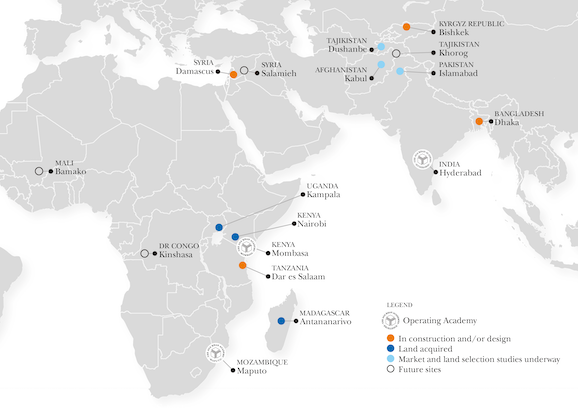
The Academies Network
The Aga Khan Academy Dhaka is the fourth in a network of Aga Khan Academies being established in countries across Africa, South and Central Asia, and the Middle East. The first Academy opened in Mombasa, Kenya in 2003, the second in Hyderabad, India in 2011 and the third in Maputo, Mozambique in 2013.
The aim of the Academies is to develop future leaders with the skills and knowledge to support positive development in their societies. We achieve this by recruiting exceptional young people from all backgrounds and providing them with the highest international standard of education.
Admission is competitive and based on student merit, regardless of a family’s ability to pay. Each Academy endeavours to meet the demonstrated financial need of each admitted student.
When complete, the network of Academies will form a global learning community of approximately 18 schools in 14 countries (map). They will eventually serve approximately 14,000 girls and boys of exceptional calibre, graduating 1,500 students annually.
For more information, visit our Academies network home page.
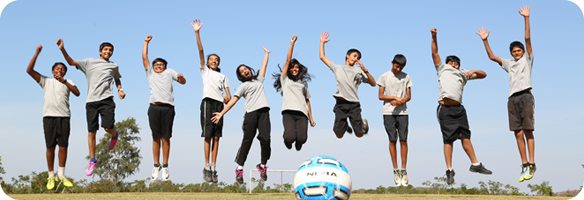
University Counselling
The Aga Khan Academy Dhaka’s counselling programme offers students a vast array of resources designed to help them find good matches between themselves and universities/colleges. These resources include a dynamic and well-resourced college counsellor, a wealth of printed, video and online tools, and a series of informational workshops and seminars on topics central to the college discovery process.
Our counsellors engage students in individual conferences designed to help students reach a greater awareness of who they are. Armed with a well-articulated sense of self, students are prepared to find universities or colleges that are the best fit. Ours is a student-centred approach, and we believe that the likelihood of satisfaction with their choices is enhanced when students are empowered to 'own' the process. Also key to success is good communication among all parties: students, parents and college counsellors. While outcomes are important, it is the process of self-discovery and college discovery on which our programme focuses. For information, reach out to our University Counsellor, Ms Nusrat Sharmin at nusrat.sharmin@agakhanacademies.org.
Click here to find the 2024-25 school profile.
Click here to download a copy of the latest handbook.
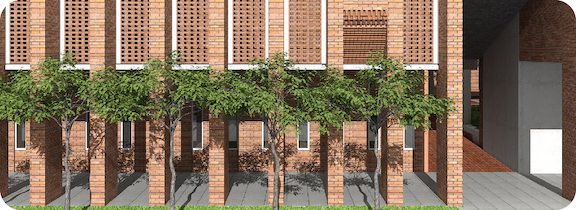
Living on Campus
Residential life at the Academy complements and extends the academic experience. Our residential programme includes a broad selection of activities and leadership opportunities to enhance students’ learning and growth.
The Academy’s residences include facilities to accommodate both students and teachers. Our residences house boarding students requiring accommodation as well as those participating in international exchanges between the Aga Khan Academy Dhaka and other Academies and schools.
Teachers' quarters on campus house both resident and visiting faculty.
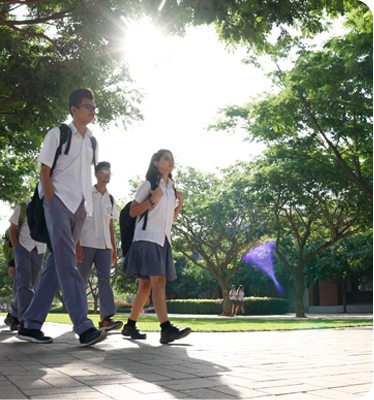 Learning beyond the classroom
Learning beyond the classroom
Our residential programme is about the learning and growth that comes through constant interaction with a diverse and talented group of teachers and peers.
Mealtimes and other gatherings provide our residential students with opportunities for informal interaction as well as for discussions, meetings, language tables and study groups.
The focus of the residential experience is on students’ intellectual, social, spiritual and physical growth in a structured and ethical environment. Many of the least tangible but most important elements of an education – the development of practical leadership skills, the capacity to make ethical judgments, the ability to navigate through complex cultural settings – are formed outside the classroom.
The safe and secure environment of the Academy’s boarding facilities gives students of all backgrounds the opportunity to thrive emotionally, intellectually and physically.
Aga Khan Curricular Strands
The Aga Khan Curricular Strands (AK Strands) are a unique part of the programme offered by the Aga Khan Academies. The AK Strands are areas of learning aimed specifically at developing knowledge, skills and attitudes required by future leaders.
Our goal at the Academies is to develop young people who have strong local roots and are also globally minded. They should be able to become leaders in whichever fields they choose.
To help achieve this goal, we have identified five areas of learning, the Aga Khan Curricular Strands, that we believe are important for our students. These are:
- Ethics
- Pluralism
- Cultures (with an emphasis on Muslim civilisations)
- Governance and Civil Society
- Economics for Development.
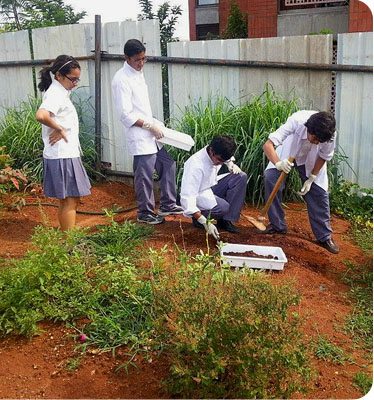 Implementing the AK Strands
Implementing the AK Strands
The Aga Khan Curricular Strands are not taught as independent subjects. Instead, we weave them into the existing subject areas of the academic curriculum. They help inform the selection of content and themes for study. The AK Strands also provide direction for school life outside the classroom in areas such as policy making, recruitment, student life and residential life.
Two of the AK Strands, Ethics and Pluralism, help students develop values and dispositions required by ethical leaders. Our students learn about these areas in theory and are also encouraged to practice what they learn in their everyday lives.
Through the other three AK Strands, our students learn about ideas that are important to the functioning of societies. In particular, they learn about how these ideas impact people’s lives in countries of the developing world. The knowledge they gain helps them understand key issues from both local and international perspectives.
The AK Strands in practice
The Aga Khan Curricular Strands were developed at the first Aga Khan Academy in Mombasa and are designed to be used in different cultural contexts. Teachers at the Aga Khan Academy Hyderabad helped tailor the AK Strands for the local environment in India and the teachers at the Aga Khan Academy Dhaka will do the same.
For example, grade 3 students worked on a history and geography unit about Hyderabad that related to Economics for Development. The students examined how the physical features of the area influenced the city and its economic activity. They learned about employment today and also looked at traditional forms of work, including a visit to a nearby weaving cooperative. This unit helped the students understand both general ideas about economics and their impact on daily life in Hyderabad.
Through the Aga Khan Curricular Strands, our students develop attitudes and values that will help them throughout their lives. They also gain knowledge and understanding that will allow them to contribute positively to their societies in the future.
For more information on the educational programme offered at the Aga Khan Academy Dhaka, please visit the Academic Programme page.
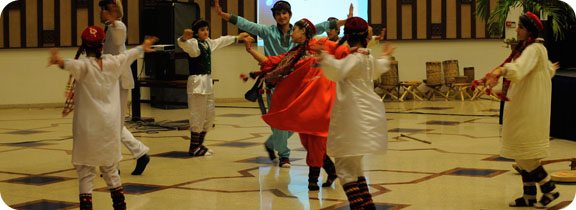
International Exchanges
As the network of Aga Khan Academies becomes further established, we will offer our students the opportunity to broaden their experience through exchanges with other Academies.
The Aga Khan Academy Dhaka will include an international exchange programme as part of the Senior School curriculum. This will provide our students with the opportunity to study for an extended period in another of the 18 Academies (planned or currently under development) in Africa, South and Central Asia, and the Middle East.
An inaugural programme is planned for the 2018-19 academic year for grade 9 students at the Aga Khan Academy Mombasa and the Aga Khan Academy Hyderabad. The programme will grow over the coming years, drawing in more Academies as they open and giving students the opportunity to experience life in a range of different countries and cultures.
Campus life
Students from Dhaka who participate in an exchange with another Academy will live in residential facilities in a secure campus setting.
Campus life is an important part of the international exchange programme. Many of the least tangible but most important elements of an education – the development of practical leadership skills, the capacity to make ethical judgments, the ability to navigate through complex cultural settings – are formed outside the classroom. Mealtimes and other informal gatherings offer opportunities for discussion, meetings, and study groups.
The exchange will offer a structured programme of activities, both on and off-campus. This is designed to increase students’ understanding of their own and other cultural identities, to recognise different components of culture, to interact with the local community through service learning, and to reach a comparative understanding of the process of development in another country.
Benefits of study abroad
The International Baccalaureate programme is implemented through the medium of English at all Aga Khan Academies. The common curriculum will allow students to study abroad without facing uncertainties regarding compatibility of course study or examinations. Students will also learn to appreciate and respect other nationalities, cultures and intellectual traditions through direct contact with people in other countries. They will broaden their worldview and learn to be at ease in different cultural settings.
The exchange will increase students’ willingness and ability to collaborate across borders and cultures, as they form networks of friendships across the world. It will build the strength of character necessary for ethical and pluralistic leadership. Students will develop greater adaptability and resilience as they learn to overcome the challenges of living in a new cultural setting with local peers.
For further information on the educational programme offered at the Aga Khan Academy Mombasa, please visit the Academic Programme page.
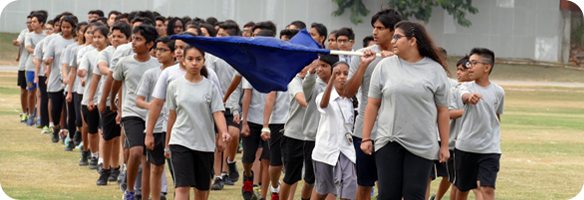
Diploma Programme
The Aga Khan Academy Dhaka is an International Baccalaureate (IB) authorised World School and has been authorised for the Diploma Programme (DP). The DP is a demanding, pre-university-level course of studies. It is internationally recognised by over 2,000 universities worldwide.
The DP has a reputation for rigorous assessment of student achievement. Each student’s performance and levels of knowledge are examined internally by teachers according to set criteria. They are also assessed externally by independent examiners according to global standards applied to all IB schools.
Our students study all the subjects covered in a traditional, broad curriculum, including languages, social sciences, experimental sciences, mathematics and the arts. The DP also takes the curriculum a step further through three unique programmes:
- Theory of knowledge;
- Creativity, activity, service; and
- Extended essay.
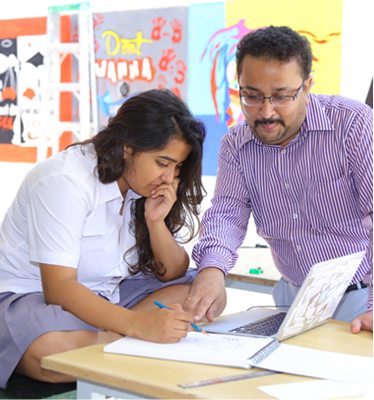 Theory of knowledge
Theory of knowledge
Theory of knowledge (TOK) is an interdisciplinary requirement unique of the DP. It encourages students to reflect on the knowledge they gain both inside and outside the classroom.
One hundred hours of classroom time are dedicated to the TOK programme. We challenge our students to question the nature of knowledge across disciplines, to recognise biases and to analyse evidence using rational thought and argument. By making our students consider and appreciate different perspectives, TOK contributes towards a pluralistic outlook.
Creativity, activity, service
Creativity, activity, service (CAS) is an important component of the IB curriculum and is required for every DP student at the Academy. Our students participate actively in a variety of creative endeavours, physical activities and community service projects. They develop self-confidence, teamwork and leadership skills, and a sense of civil responsibility.
Students take part in sustainable projects that have real and lasting effects on the greater Dhaka community. They develop strength of character and an understanding of their ability to bring about change.
The CAS programme is valued for its power to transform the lives not only of students but also the people they work with. It serves as a platform for interpersonal exchange, personal growth and greater understanding of the issues we face as a global community.
Extended essay
The extended essay (EE) requires students to pick a subject of their choice and research and develop it into a 4,000-word essay. Students may choose to investigate a subject from one of their higher-level courses more deeply. Or they can broaden their academic experience by researching a subject in a field they are not currently studying.
Through the EE, we introduce students to the kind of independent research and writing skills expected at the university level.
For further information on the IB Diploma Programme at the Academy, please see the admission requirements or contact us.
